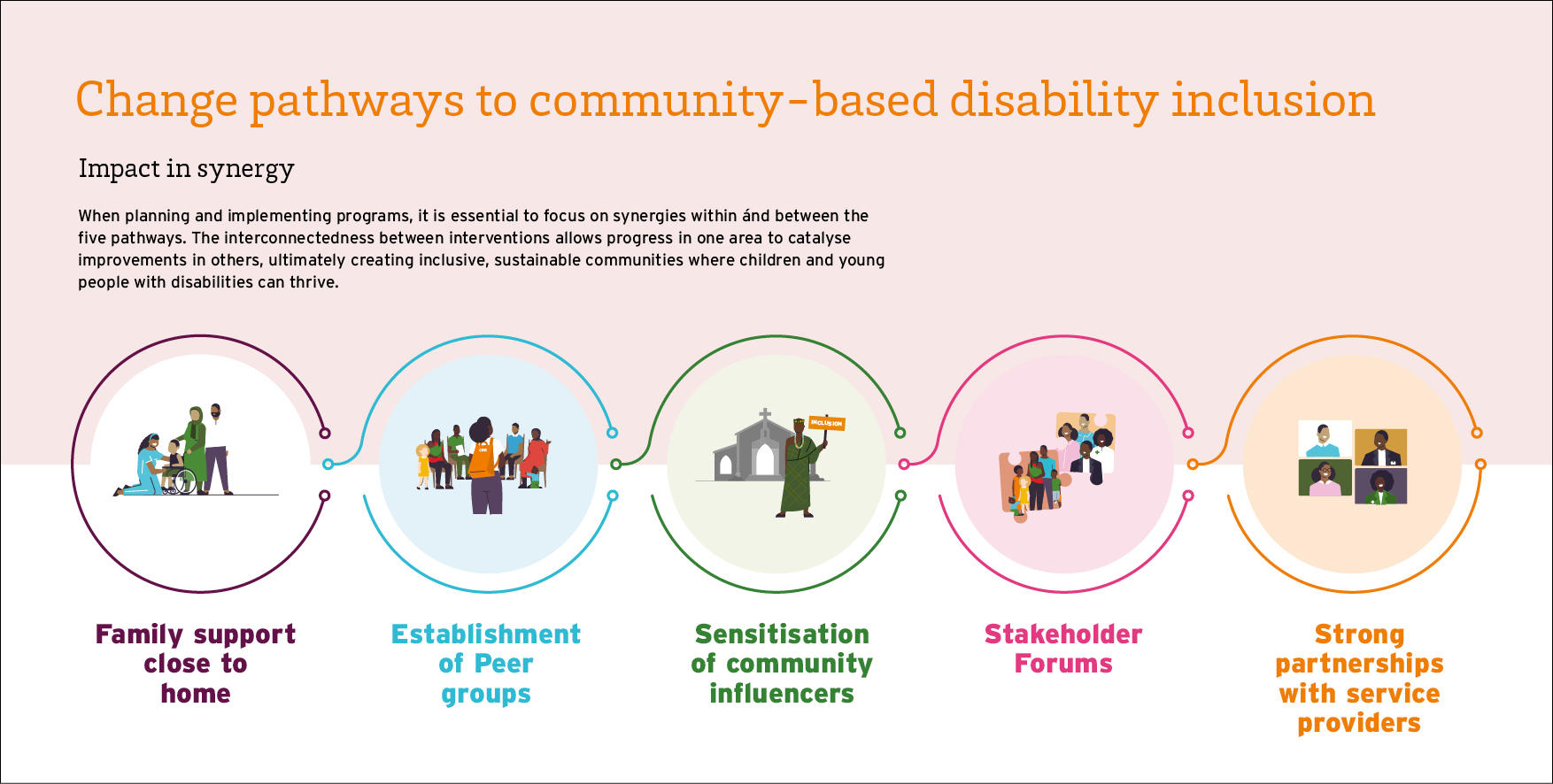How does Community-Based Rehabilitation create change?

New policy papers on disability-inclusive development released
How can community-based approaches and inclusive leadership transform the lives of children and youth with disabilities in low- and middle income countries?
This question has guided four years of collaborative research under The Breaking down Barriers 2.0 programme, led by Liliane Fonds with Radboud University, academics and civil society organisations in Cameroon, Zambia, and Sierra Leone. The resulting five policy papers share practical insights and recommendations for strengthening disability-inclusive development.
The researches unpack how community-based rehabilitation and inclusive development approaches (CBR/CBID) create change. In-depth research in Zambia, Cameroon and Sierra Leone unpacked five interdependent change pathways to reach impact. These change pathways are summarised in the infographic below and can be used for planning, implementation and evaluation of community-based inclusion programmes.

The research findings were presented first during the Breaking down Barriers conference in 2024. During this conference interesting similarities were discussed between the gender mainstreaming and disability mainstreaming. As a spin-off from this conversation a paper was written with 4 key recommendations how the challenges from gender mainstreaming can be overcome for disability inclusive development.
Read the full papers below:
- Unlocking Synergies: The Holistic Impact of CBR/CBID in Sierra Leone, Cameroon, and Zambia
By Willem Elbers, Aisha Ibrahim, Valentine Ngalim, Samuel Macauley, Thomas Mtonga, Ngoran Mathew Banlanjo, Glory Tsangue and Angelique Kester
Brings together the in-depth researches from Zambia, Cameroon and Sierra Leone and shows how five interconnected pathways amplify impact across countries, while also revealing the vulnerabilities when one pathway falters. The annex of the paper includes concrete programmatic activity recommendations.
- Patterns of success in CBR: Insights from the EDID Program
By Valentine Banfegha Ngalim, Agho Glory, Ngoran Mathew Banlanjo, Willem Elbers
In-depth study from Cameroon which explores how the Empowerment and Disability Inclusive Development (EDID) program promotes disability inclusion through five change pathways and six design principles that empower families and transform communities.
- Pathways to inclusion: Assessing critical success factors in Community-Based Rehabilitation programs in Sierra Leone
By Aisha Fofana Ibrahim & Samuel Macauley
In depth study from Sierra Leone which highlights how disability-led organisations use outreach, peer support and stakeholder engagement to foster inclusion and address both immediate needs and systemic barriers.
- Blueprint for success in CBR/CBID? Understanding the change pathways and critical design principles of the ZECREP Project
By Willem Elbers & Thomas Mtonga
In depth study from Zambia analyses the ZECREP project, demonstrating how four synergistic pathways and holistic design principles foster empowerment and systemic change.
- What can disability mainstreaming learn from three decades of gender mainstreaming?
By Tine Davids & Willem Elbers
Spin-off paper from the Breaking down Barriers 2024 conference which draws lessons from gender mainstreaming to strengthen disability inclusion strategies, emphasizing clear goals, internal change, shared responsibility, and intersectionality.
The next series series of publications are already in the pipeline and expected early 2026, stay tuned for more about how CBR/CBID approaches can be sustained.
Contact
For inquiries about the Breaking down Barriers project, contact:
Jan Apperloo, Learning & Knowledge development adviser
E-mail: japperloo@lilianefonds.nl



